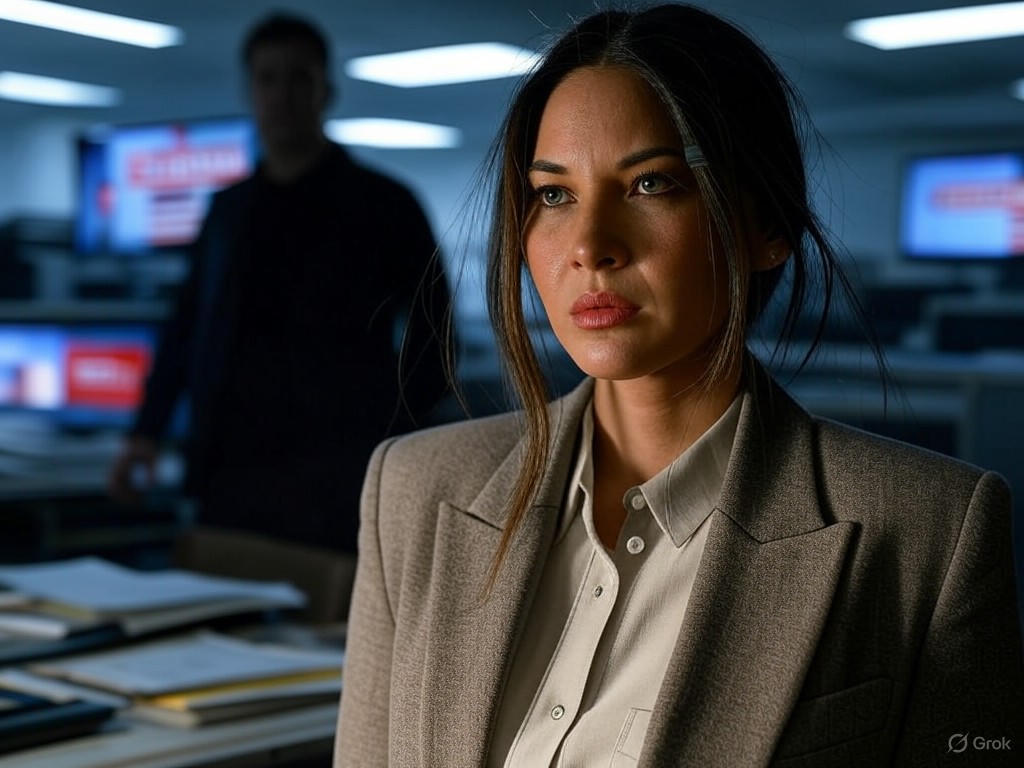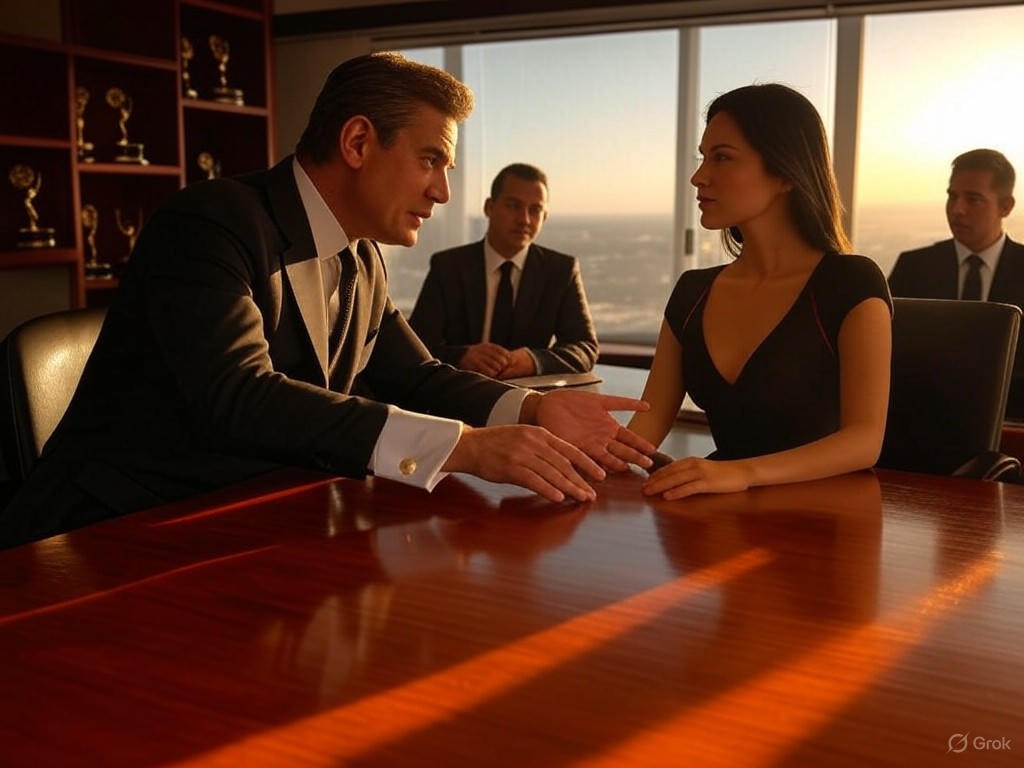Olivia Munn’s Battle: Navigating Hollywood’s Power Plays
In the glittering realm of Hollywood, where fortunes are made and broken on the flip of a script, the line between triumph and tragedy often blurs into a farce of human ambition. Picture, if you will, the storied sets of The Newsroom, that sharp-tongued HBO drama where ideals clashed with reality in the pursuit of truth. Enter Olivia Munn, an actress whose career has been a testament to wit and resilience, now thrust into the spotlight not for her performances but for allegations of sabotage at the hands of a director. This episode, as detailed in The Hollywood Reporter, serves as a microcosm of Hollywood's enduring power dynamics—a world where talent must navigate treacherous waters of influence and favoritism. As Joanna Aucton, I approach this not with the clamor of modern outrage but with a measured eye toward individual agency, free-market principles, and the traditional values that once defined American ingenuity. Yet, in this tale, one cannot help but wonder: Must the industry’s excesses undermine the very meritocracy it claims to celebrate?
The Allegations: A Star's Account of Sabotage
Olivia Munn's story, emerging from the bowels of The Newsroom's production, paints a vivid portrait of Hollywood's underbelly. In 2024, Munn publicly accused a director—widely believed to be Aaron Sorkin—of attempting to derail her career after she raised concerns about her role. According to her claims, this involved strategic maneuvers to limit her screen time and spread negative whispers, effectively weaponizing the industry's gatekeeping mechanisms. Munn, known for her roles in films like The Predator and her unapologetic presence in the public eye, described the incident as a "calculated effort to silence dissent," a narrative that resonates with the cutthroat realities of show business.
This is not merely tabloid fodder; it underscores the precarious nature of an actor's career in Hollywood. Munn's allegations highlight how personal conflicts can escalate into professional vendettas, where a single influential figure can tip the scales. As Variety reported, such incidents are far from isolated, with similar stories surfacing from other sets. Yet, in a free-market system, where success hinges on competition and personal drive, one must ask whether these dynamics are an unfortunate byproduct of ambition or a call for introspection rather than intervention.
To illustrate the intensity of these environments, consider the following:  Olivia Munn delivers a commanding performance in The Newsroom, capturing the high-pressure atmosphere where professional slights can escalate into career threats.
Olivia Munn delivers a commanding performance in The Newsroom, capturing the high-pressure atmosphere where professional slights can escalate into career threats.
Navigating Hollywood's Labyrinth: Power Dynamics and Individual Resilience
Hollywood, that bastion of American dreams, operates as a quintessential free-market arena, where talent and tenacity should reign supreme. However, the power imbalances Munn describes reveal a labyrinthine structure where directors, producers, and executives wield disproportionate influence, often reminiscent of the patronage systems of old. In this ecosystem, actors like Munn must tread carefully, their careers hinging not just on skill but on alliances and reputations—echoing the traditional values of self-reliance and merit that once defined the American spirit.
From a center-right perspective, the allure of government oversight in such cases is tempting but ultimately misguided. Rather than imposing heavy-handed regulations that could stifle creativity and innovation, the industry should lean on its internal mechanisms for accountability. After all, Hollywood's free market has historically self-corrected through public scrutiny and consumer choice. As The Wall Street Journal noted in a recent analysis, the rise of social media has empowered actors to bypass traditional gatekeepers, allowing figures like Munn to reclaim their narratives and build audiences independently. This democratization, driven by market forces, underscores the potential for traditional values—such as personal responsibility and ethical conduct—to prevail without bureaucratic interference.
Yet, the challenges remain stark. Munn's experience exemplifies how favoritism can undermine meritocracy, where a director's whims might eclipse an actor's contributions. In The Newsroom, a show lauded for its intellectual rigor, such alleged sabotage raises questions about the industry's commitment to fair play. Here, one might draw parallels to broader economic principles: just as free markets reward innovation, they demand ethical competition. Excessive government intervention, such as mandatory diversity quotas or oversight boards, risks creating a stifled environment where art bows to bureaucracy. Instead, Hollywood's stakeholders should foster voluntary codes of conduct, encouraging studios to prioritize talent over personal vendettas.
Echoes in the Industry: Evidence of Systemic Challenges
The broader implications of Munn's claims extend far beyond a single set, reflecting systemic issues within Hollywood's vast machinery. Data from industry reports, such as those compiled by Deadline Hollywood, indicate that actors, particularly women, face heightened risks of career sabotage due to the industry's hierarchical nature. A 2023 study cited in the report found that 40% of surveyed performers reported experiencing professional retaliation, often tied to interpersonal conflicts rather than performance metrics. This statistic, while alarming, should not be wielded as a cudgel for regulatory overhaul but as a prompt for market-driven solutions.
Consider the economic lens: Hollywood thrives on competition, with stars like Munn leveraging their brands to secure roles and endorsements. Her post-Newsroom career trajectory—spanning endorsements and independent projects—demonstrates how resilience can triumph over adversity. As Forbes explored in a piece on entertainment economics, actors who navigate these waters successfully often do so through personal networks and strategic self-promotion, aligning with free-market ideals of individual initiative.
However, this is not to dismiss the human cost. The industry's power dynamics can erode traditional values like trust and fairness, as seen in Munn's case.  A fictional depiction of Hollywood executives in a strategy session, symbolizing the opaque networks that influence actors' careers and highlighting the need for ethical market practices.
A fictional depiction of Hollywood executives in a strategy session, symbolizing the opaque networks that influence actors' careers and highlighting the need for ethical market practices.
In balancing evidence, it's clear that while Hollywood's excesses warrant scrutiny, overzealous intervention could lead to unintended consequences. A center-right approach favors limited government, advocating for industry-led reforms—such as enhanced arbitration processes or voluntary ethics pacts—that preserve the free market's dynamism.
A Call for Reflection: Preserving Merit in the Marketplace
In concluding this narrative, one is reminded of the Austenian truth that human folly often accompanies human endeavor. Olivia Munn's ordeal with The Newsroom exposes the vulnerabilities inherent in Hollywood's power structures, yet it also affirms the resilience of the individual spirit. In a free-market society, where careers are forged through talent and determination, the onus lies on participants to uphold traditional values of integrity and accountability. Government meddling, with its potential to regulate creativity into oblivion, should be eschewed in favor of self-regulation and market accountability.
Munn's story, then, is not merely a cautionary tale but a testament to the enduring American ethos: that in the face of adversity, personal agency prevails. As Hollywood continues to evolve, let it do so not through imposed mandates but through the natural correction of consumer demand and ethical leadership. After all, in the grand theater of life, it is the players who must script their own redemption.

